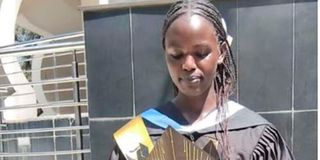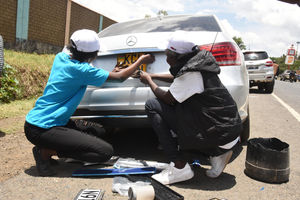
From left: Kelvin Kiprotich, Sheila Chepchirchir, Celestine Muchika and Victor Kemboi.
For many years, getting a first-class honours degree was considered the golden ticket to a successful and fulfilling career. However, for many graduates in Kenya, that promise is quickly proving to be an illusion.
Despite excelling academically, countless first-class degree holders are finding themselves stuck in an endless cycle of job applications, unanswered emails and disheartening rejections. Why are the brightest minds struggling to secure employment in a market that supposedly values merit?
Bravin Mwangi*, 27, a first-class graduate in computer science, has found it incredibly difficult to secure a job despite his academic success. “I can’t get a job, even with my nice degree. I have applied to so many companies, but they just keep rejecting me at the first stage. Other times, I don’t even get a response, which is really rude,” he says.
Bravin has taken all the necessary steps to modify his résumé. “My CV has been checked several times by professionals, so it’s not the issue. I’ve polished it countless times, even using chatbots to make sure it’s perfect.” Bravin is applying to roles that specifically require a computer science degree, but he still doesn’t get past the first stage.
The only reason he can think of, is his past performance in high school. “I got a C+ in KCPE, but I thought I redeemed myself by getting a first-class degree in university.”
Bravin notes that many of his former classmates with similar degrees have found jobs with ease. He wonders whether he should change his approach. “Should I say on my CV that I graduated with a Second Lower honours instead? Maybe these companies are looking for average achievers…I don’t know.
“It really makes me furious because I worked so hard for this degree. I want to give up. I feel like just finding a menial job or becoming a tout. I feel unwanted and useless. It is depressing.”
Taking odd jobs
Kelvin Kiprotich, 25, a recent graduate from Moi University with a first-class degree in Penology and Security Studies, is facing the same struggles.

Kelvin Kiprotich, a First-Class graduate in Penology from Moi University.
“I was very happy when I learned that I got first-class honours. It has been my big dream to succeed in university,” he says. Kelvin chose to specialise in the field of justice and conflict resolution, focusing on subject like probation and rehabilitation.
During his internship, Kelvin worked at a probation station, where he conducted numerous interviews with both convicts and inmates. “I learned that many Kenyans are being convicted for crimes they didn’t commit,” he says, adding that his experience at the probation station gave him valuable insight into the country's justice system.
Despite his academic success and hands-on experience, Kelvin has found it difficult to break into the job market. “I have written a lot of application letters, attaching my CV, and sending them to various companies dealing with justice in Kenya, but many of them have not yet responded. They just ghost me,” he says. This has left him feeling frustrated.
“The most distressing thing is waiting for a reply to my applications. Employers need to value and consider skilled people from this field of justice because we are fewer in the job market compared to others like teachers and engineers.”
Kelvin has resorted to taking odd jobs to make ends meet. “For now, I’m just hustling, doing other jobs outside my degree. I will be very happy when I get employment. It will solve a lot of my problems, and I will use that opportunity to help my community and render justice to all people, not only in Kenya but also abroad,” he says. His advice to students pursuing a similar degree is, “Let me tell them to go for it and trust God that one day the doors will open. This course is good, only that many have not yet realised its importance in society,” he says.
Pursuing further education
Celestine Muchika’s journey has been marked by dedication, academic achievement, and significant emotional challenges. With a Master’s degree in Applied Mathematics from Kaimosi Friends University (2022) and a First-class Honours Bachelor’s degree in Education Arts (specialising in Mathematics and Geography), Celestine entered her teaching career with high hopes. Despite these stellar qualifications and her experience as a part-time lecturer, Celestine faces the frustrating reality of prolonged unemployment. "I am unemployed and honestly, I’m struggling emotionally, mentally, and financially," she shares.

Celestine Muchika, a first-class graduate with a Master’s in Applied Mathematics, faces the tough reality of unemployment despite her qualifications and teaching experience
Her passion for teaching began with a deep love for numbers and logic. "Mathematics has always been my favourite. I enjoy solving problems and finding patterns," Celestine explains. Geography, on the other hand, sparked her interest in understanding human and natural systems. Together, these subjects shaped her academic and career aspirations.
When she graduated in 2020, Celestine was full of optimism.
"I genuinely believed that my performance would open numerous doors of opportunity," she recalls. But despite sending out multiple applications to schools and universities, she received no responses or feedback. "I didn’t expect the job market to be this challenging," she says, acknowledging the difficulties compounded by Covid-19.
Hoping to make herself more competitive, Celestine pursued further education. "Even with the Master's, the opportunities haven’t been forthcoming," she reflects, noting that the job search has remained a cycle of hope and disappointment.
In 2023, Celestine secured a part-time lecturer position, which temporarily alleviated her struggles. "It reignited my passion for teaching,” she says. But when the contract ended, the cycle started again. “The most frustrating part is the helplessness. You work hard, get the grades and gain experience, but still find yourself with no opportunities.”
Emotionally, the experience has taken its toll. "There are days I feel hopeless, worthless, and defeated," she admits. Depression, self-doubt, and loneliness are constant companions in her struggle to move forward. Faced with the pressure of unemployment and financial strain, Celestine has considered changing careers. “It’s not an easy decision,” she says, referring to her contemplation of fields like data science or business. Starting over, however, feels daunting without the resources or guidance she needs.
Celestine also feels that merit is often overlooked in Kenya's job market. "It feels like who you know matters more than what you know," she says and adds that there is need for systemic change in terms of better graduate mentorship, more job placement services, and stronger connections between universities and employers. "Graduates need guidance, not abandonment,” she says.
She advises current students to build networks and develop soft skills while being resilient and patient.
Sadness and disappointment
Sheila Chepchirchir’s story is a poignant example of how academic excellence, while commendable, doesn’t always guarantee success in the job market. She graduated with a Bachelor of Science degree in Environmental Health from Kenyatta University, and achieved first-class honours.

Sheila Chepchirchir, a first-class honours graduate in Environmental Health from Kenyatta University.
“Getting a first class had always been a dream from the moment I joined campus. But by the time I was in my third year, I had lost hope of achieving it because at this time, my grades had dropped.”
It wasn’t until a classmate casually mentioned it that she first heard the good news. "I first heard that I had gotten first class from a classmate, but I did not take it seriously because the school had rolled out three graduation lists, and my name had not yet appeared on any of them," she recalls. Despite her scepticism, she decided to wait for the official confirmation from the university. "I was really praying silently that it be true.”
That moment came one morning as she and her mother were having breakfast. “I saw someone post the fourth list in the class group, so I downloaded the list, and as I was looking for my name, I started seeing congratulation messages popping on my screen," Sheila recounts. "That's when I knew that it was true. I had gotten first class, and the moment felt very surreal.”
Her mother, who had always been her greatest source of motivation, was ecstatic.
"She was hugging and squeezing me. She was very, very happy. I was thankful to God because this was an answered prayer. Sheila’s motivation stemmed largely from her mother’s sacrifices. "From a very young age, I saw my mum sacrifice so much just to put my siblings and I through school. There's a time I told her that I was aiming for first class, and she told me not to pressure myself. She said, 'Even if you get second class, I will be fine.' But deep down, I really wanted to get that first class. I wanted to give her something equal to the effort she was putting."
Despite the academic success, Sheila’s transition into the job market has been fraught with challenges. "I expected to get an internship or a health-related entry-level job because those don’t require so much experience, but I’ve been sending out applications for four months now with no response. It’s disappointing."
Sheila set up a LinkedIn account and subscribed to job postings through platforms like Campus Biz Careers, My Jobs in Kenya, and Opportunities for Youth. "Nothing seems to be working. The silence from employers is deafening."
One of the key barriers Sheila faces is the financial cost of obtaining her license to practice as a public health officer. "I need to sit for a board exam, which costs about Sh28,000. Right now, getting that money is a challenge so I can’t sit for the exam, and I can't get a license to practice.”
In addition to these financial hurdles, Sheila recounts an emotionally challenging job interview experience. "A friend referred me to a job that was completely unrelated to what I had studied, but I had that mentality of, 'I can work anywhere,'" Sheila went for the interview, and one of the panellists made a really harsh comment.
“It took me a while to recover from it. I was really disappointed and sad for a long time.”
Despite the emotional toll, Sheila managed to stay motivated through the support of her friends and her belief that setbacks are part of the journey. "Things happen for a reason. I had to go through that experience to learn what goes on in interview rooms.”
Sheila also believes the job market doesn’t place enough value on academic achievements. "A friend told me about a job vacancy at the company she works in. The boss isn’t so keen on academic qualifications but on what you can do. I now know that showing that you are capable of doing the job is more important than your academic achievements.
"There are mornings when you wake up and lack the energy to send in another application. But I’m thankful for my friends who help me unwind by talking about our worries and disappointments. It really helps."
Sheila has begun looking into volunteer work to gain experience and says that she still believes the pursuit of first-class honour was worthwhile.
"It was absolutely worth it. I achieved my dream, I brought honour to my parents, and I made them really proud. Mine was the first-ever first-class degree in the village I come from, and I am grateful that I have become an inspiration to others.”
Despair and frustration
Victor Kemboi, 25, who graduated from Kenya Highlands University with a Bachelor of Education Arts, remembers the moment he graduated with a clear sense of pride.

Victor Kemboi, a 25-year-old graduate of Kenya Highlands University.
“That day I felt such a rush of accomplishment…like I had conquered something really big.”
However, the glow didn’t last long. After the celebratory dust settled, he found himself staring into a future that felt overwhelmingly bleak.
“Reality came knocking. There is no clear roadmap after you leave university. No fixed routine, no class schedule, no lectures to attend—just you, your dreams, and the world.”
Kemboi says life post-graduation has been nothing short of eye-opening. There have been good days—filled with bursts of motivation and hope—and hard ones, when he feels weighed down by uncertainty and self-doubt.
“I think more people should talk about just how much of an adjustment it is. It has been for me a period of self-discovery and learning how to manage time, expectation, and also disappointment.”
Victor always knew he wanted to be a teacher. “Honestly, I felt called to do it. Even as a child, I admired teachers. I saw the impact they had—not just academically, but in shaping lives.”
He recalls his time in high school when he was the go-to student for explaining concepts to his classmates. “I enjoyed that process of breaking things down and helping someone finally say, ‘Oh, I get it now.’ That inspired me to take it seriously.”
For Victor, pursuing a Bachelor of Education wasn’t just a career choice, it was a purpose-driven calling. His university years were a mix of challenges and growth. Academically, he says it was tough—but in a good way. “The workload, deadlines, presentations, and also the teaching practice all shaped my discipline. I had some lecturers who truly inspired me, and others who—well, let’s just say they taught me patience.”
Outside class, Victor threw himself into student activities, from football teams to various clubs, which helped him hone soft skills like leadership, communication, and teamwork. He also built friendships he still treasures today. But not everything was smooth.
“There were also moments of struggle—financial stress, mental fatigue, burnout—but all of that helped me to grow,” he says.
Since graduation, Victor has been actively applying for jobs—particularly in teaching, both in public and private institutions. “I created a solid curriculum vitae and a cover letter,” he says. “I’ve been updating my profiles on job platforms regularly. I try to stay consistent with my applications and keep track of the roles I apply for.”
His job search routine includes applying to several openings each week. But despite all that effort, the outcome has been disheartening.
“To be honest, I’ve gotten a few replies. I’ve attended some interviews, mostly in private schools or for short-term teaching contracts, but nothing long-term or stable yet. That’s really frustrating,” he says.
Victor is baffled by the demand for experience, even in entry-level positions, which he says doesn’t make sense for recent graduates.”
He hadn’t expected the job market to be easy, but the level of difficulty has taken him aback. “I expected some difficulty, sure—but not to this extent. Joblessness gnaws at your confidence. It makes you question your choice at times. It’s frustrating.”
While teaching remains his passion, Victor is open to exploring roles outside the education sector. “I’ve looked into roles in communication, youth mentorship, customer support, and even content creation and training. My degree has taught me how to speak, write, and lead effectively, and I believe those skills are transferable.”
To stay afloat, Victor has taken on tutoring jobs, helping KCSE candidates and younger learners with writing, exam prep, and basic subjects. “These gigs don’t always pay much, but they help me stay sharp and connected to what I love doing.”
“I hate feeling stuck. You work so hard for four years, hoping to graduate and start building your life. But then, you’re thrown into a job market that doesn’t seem to have space for you. I keep wondering, did I take the wrong course? The lack of financial independence can be frustrating.
“I’ve started journaling to reflect on what I’m learning through this season. Talking to other graduates going through similar struggles reminds me I’m not alone.”
Victor has also felt pressured by those around him.
“Sometimes people ask directly, ‘When are you starting work?’ Or, ‘Why don’t you try this instead?’ Others compare you with others. It is painful.
“We need a more practical, skill-based approach to education. Students should graduate with experience, not just theory. That means more internships, mentorship programmes, and industry partnerships. Alternative paths like freelancing or starting small businesses should be encouraged and respected.”
If a younger student ever asked for advice before choosing their course?
“I’d say, don’t wait until graduation to start thinking about your future. Volunteer, tutor…get involved early. Build networks. A degree alone is not enough. It’s what you do with it that matters.”
From the expert
Jane Mutisya, a career coach and HR professional, says that while a first-class degree is impressive, it’s no longer a guarantee for employment these days.
“Academic prowess is just one piece of the puzzle. The most successful candidates are those who complement their academic achievements with soft skills, teamwork, and real-world experience.”
She observes that many high-achieving graduates focus heavily on grades and neglect other crucial skills.
“Employers today are looking for more than just a strong grade—they want individuals who can communicate, collaborate, and adapt,” she says, adding that extracurricular activities, internships, and leadership roles in student clubs help graduates become more well-rounded and attractive to employers.
“Universities should encourage students to take on real-world projects, internships, and even unpaid opportunities. These experiences build character, competence, and confidence. A first-class degree can open doors, but the real differentiators are how well you can work with others, solve problems, and fit into a team.
Job seekers should use their drive and determination to seek internships, volunteer roles, or side projects to build their portfolio and network. No one will refuse to hire you because you have a first-class degree, but remember—that’s just one piece of the puzzle. You need a lot more.”










